What Happens When Refrigerator Condenser Fan Fails? Expert Analysis
We may earn affiliate fees for purchases using our links (at no additional cost to you).
Ever wondered what happens when the refrigerator condenser fan fails?
Get ready for an icy investigation as we dive into the heart of your fridge’s cooling system.
From strange noises to potential system damage, we’ll uncover the chilly truth behind a failing condenser fan.
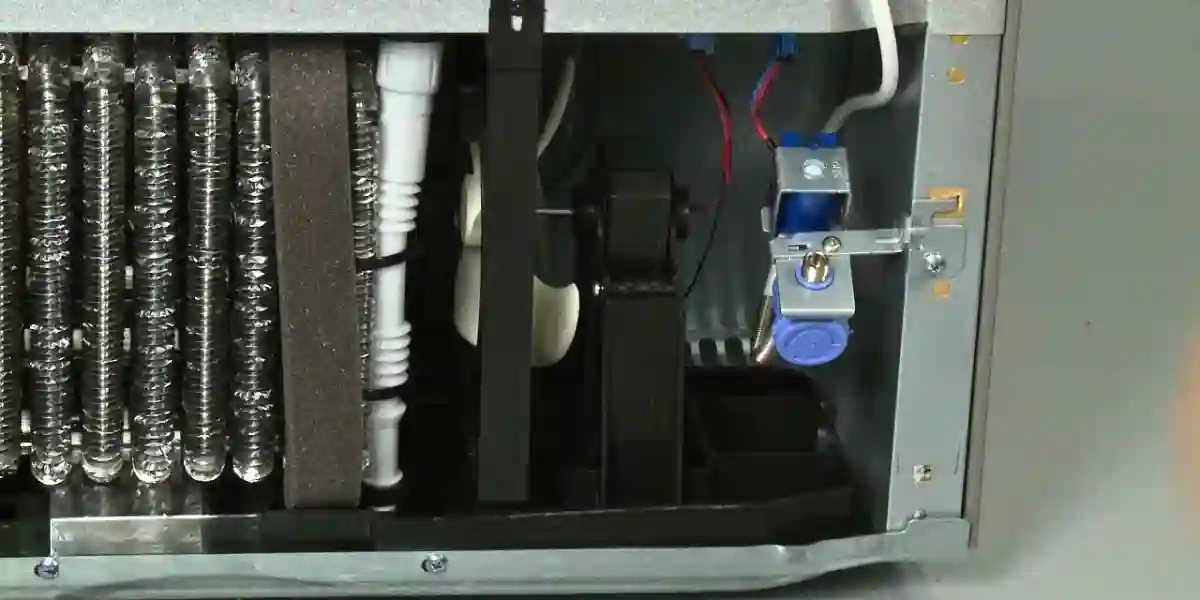
What Happens When Refrigerator Condenser Fan Fails?
When your refrigerator’s condenser fan fails, the compressor works harder, causing strange noises.
Your food might not stay cold due to trapped heat without proper airflow. This failure can elevate the fridge temperature, overheat the compressor, and cause system damage.
9 Common Signs of a Failing Condenser Fan
Refrigerator Continually Runs
Your refrigerator shouldn’t run all the time. The job of the condenser fan is to cool down your refrigerator. If the fan isn’t doing its job right, your fridge will keep running.
This means it will use more power and your energy bills will go up. The fridge parts might also wear out faster.
If your fridge is running all the time, you should check the condenser fan to avoid more serious damage.
Noises from the Condenser Fan
Unusual sounds coming from your refrigerator could mean a problem with the condenser fan. The fan might make noises like grinding or squealing because of worn-out parts or dirt on the blades.
If you ignore these noises, the problem might get worse. This could lead to your refrigerator breaking down and needing expensive repairs.
Fan Movement is Slow or Absent
Take a look at your condenser fan when your fridge is on. If the fan turns slower than usual or isn’t moving, there might be a problem with the fan motor.
The fan motor powers the fan. If the motor has a problem, the fan can’t work right. This could lead to your fridge not cooling well.
If you don’t fix this problem soon, the fan might stop working altogether. This could cause more damage to other parts of your refrigerator.
Air Conditioner Blows Warm Air
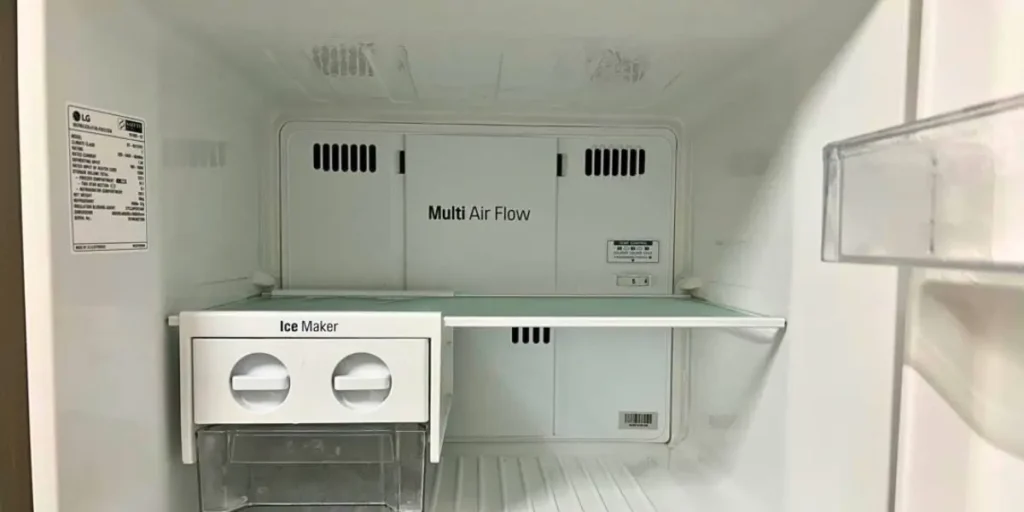
If warm air comes out of your air conditioner, it could be a problem with the condenser fan. The fan’s job is to help get rid of heat from the system.
If the fan isn’t working right, it can’t get rid of the heat well. This means the air in your fridge will be warmer. It could make it harder to keep your food and drinks cool.
You should fix this problem quickly to avoid your food going bad and to get your fridge cooling properly again.
High Energy Bills
If your energy bills are going up, it might mean there’s a problem with the condenser fan.
A broken fan makes the refrigerator work harder to cool down. This means it uses more electricity, which makes your bills higher.
If you don’t deal with this problem, the fan might get worse. This could waste more energy and cause more damage to other parts of your refrigerator.
Repeatedly Tripped Circuit Breaker
If your circuit breaker keeps tripping, it could mean there’s a problem with the condenser fan.
The fan might be using too much power because of a problem with the motor or other parts. This could overload the electrical circuit.
The circuit breaker shuts off the system to stop more damage or danger. If this keeps happening, you should get a professional to check the condenser fan and fix it.
Poor Cooling Performance
If your refrigerator isn’t as cold as it should be, it might be a problem with the condenser fan. When the fan doesn’t work, the cooling coils can’t get rid of the heat properly.
This makes the compressor work harder to cool down the fridge. This could lead to the fridge not being cold enough.
Loud Condenser Fan
A noisy condenser fan could mean there’s a problem. The fan might be making a lot of noise because the bearings are worn out or there’s dirt on the blades.
This could disturb you and make your kitchen less peaceful. A noisy fan could also cause the refrigerator to get too hot. This could lead to more problems with the refrigerator not cooling properly.
Dirty Condenser Coils
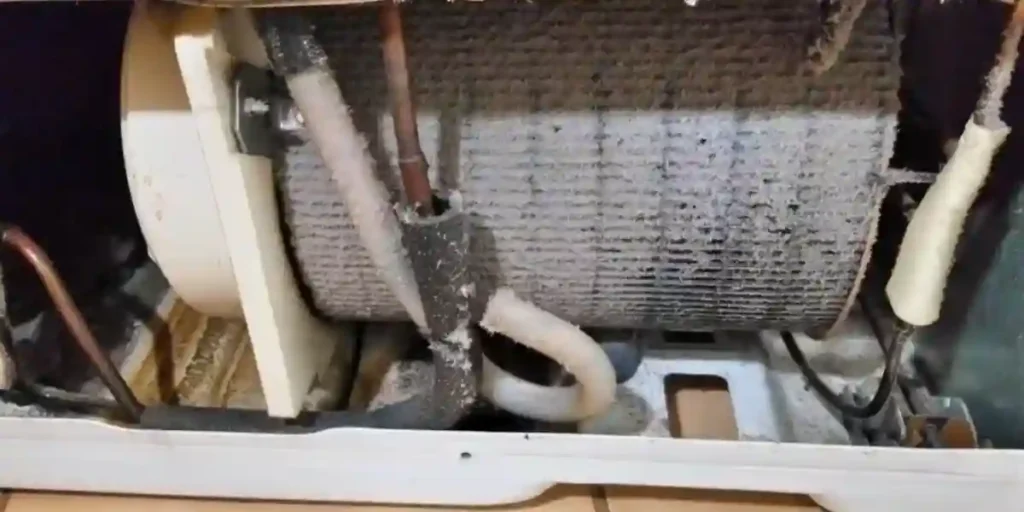
The condenser coils are very important. They take heat away from the cooling liquid in your refrigerator.
This helps the fridge stay cold. But if the coils get covered in dust and dirt, they can’t get rid of heat well.
This means the condenser fan has to work harder. If you clean the condenser coils regularly, it can help prevent problems with the refrigerator not cooling. It can also help the condenser fan last longer.
10 Steps to Fix or Replace a Failed Condenser Fan
Step 1: Diagnose the Issue
Start by unplugging the refrigerator from the power source to ensure safety.
Then, inspect the condenser fan for any visible signs of damage or obstruction, such as dirt, debris, or a broken fan blade.
Step 2: Clean the Fan and Surrounding Area
If you notice any dirt or debris buildup around the condenser fan, gently clean it using a soft brush or cloth.
Ensure that the area around the fan is also free from any obstructions to allow proper airflow.
Step 3: Check the Fan Motor
Carefully examine the fan motor for any signs of malfunction, such as unusual noises or burning smells.
If the motor appears damaged or is not functioning correctly, it may need replacement.
Step 4: Order a Replacement Fan
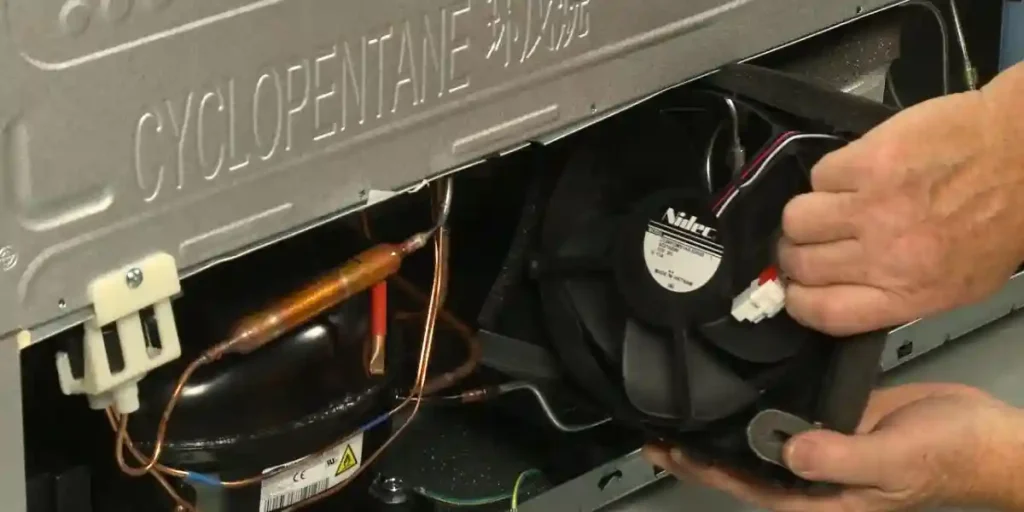
If the condenser fan is beyond repair, you’ll need to order a suitable replacement. Refer to your refrigerator’s model number and specifications to find a compatible fan.
Step 5: Gather Tools and Materials
Before attempting to replace the fan, gather the necessary tools, including a screwdriver, pliers, and gloves for safety. Ensure the refrigerator is still unplugged.
Step 6: Remove the Old Fan
Carefully detach the old condenser fan from its position, following the manufacturer’s instructions.
Take note of the wiring connections to ensure proper reinstallation of the new fan.
Step 7: Install the New Fan
Connect the new condenser fan using the correct wiring connections as noted during the removal process.
Securely attach the fan in its designated position within the refrigerator.
Step 8: Test the Refrigerator
After installing the new fan, plug the refrigerator back into the power source. Turn it on and check if the condenser fan is functioning correctly. Listen for any unusual noises that might indicate further issues.
Step 9: Observe for a Few Days
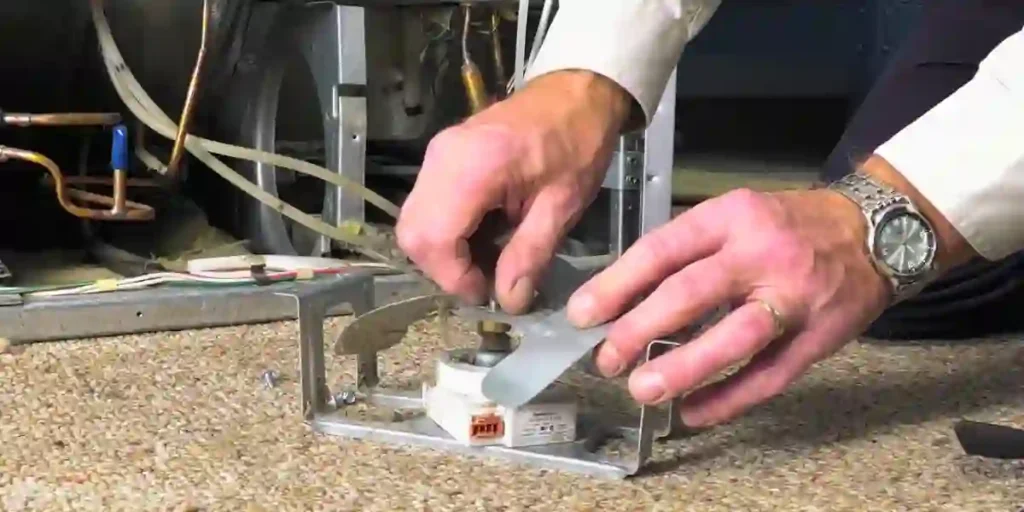
Keep a close eye on the refrigerator’s performance for a few days to ensure the new fan is functioning optimally. Monitor the temperature inside the fridge to ensure it remains consistent.
Step 10: Seek Professional Help if Needed
If the refrigerator still faces issues even after replacing the condenser fan, it may indicate a more complex problem.
In such cases, it’s best to seek assistance from a qualified appliance repair technician to diagnose and fix the problem efficiently.
Potential Risks of a Faulty Refrigerator Condenser Fan
Risk of Food Spoilage
A faulty condenser fan may result in inadequate cooling inside the refrigerator, leading to increased temperatures.
This temperature rise can cause your food to spoil before its expiration date. As a result, you may end up wasting food and spending more money on groceries.
Overworking the Compressor
When the condenser fan fails, the compressor, which is responsible for cooling the refrigerator, may be forced to work harder to maintain the desired temperature.
The additional strain on the compressor can lead to higher energy consumption, which in turn can increase your electricity bills.
Potential Fire Hazard
If the condenser fan motor malfunctions and overheats, it could pose a potential fire hazard.
Electrical components that overheat may cause a fire inside the refrigerator, endangering your home and belongings.
Damage to Other Components
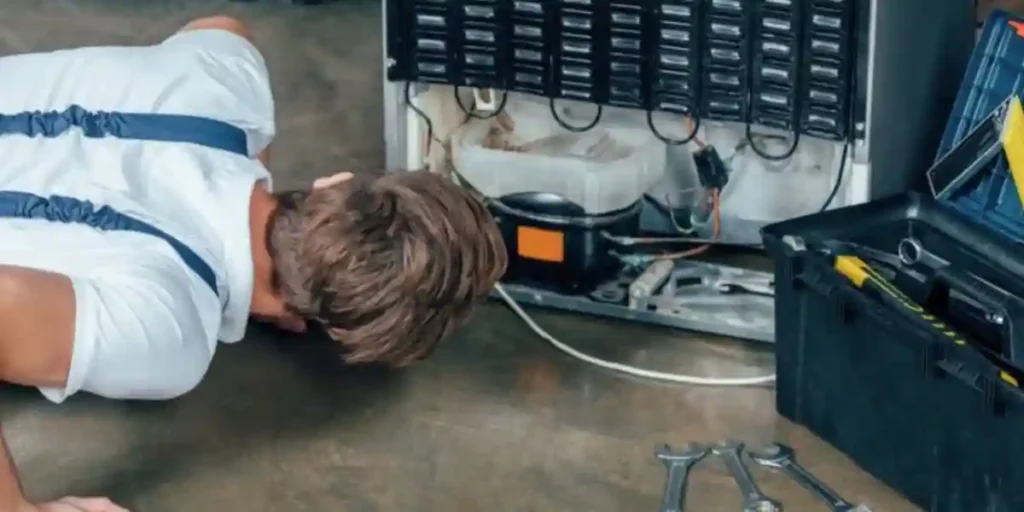
A faulty condenser fan may cause an imbalance in the refrigerator’s cooling system, leading to uneven distribution of cold air.
As a result, other components, such as the evaporator or freezer, could be affected, further exacerbating the cooling issues.
Reduced Refrigerator Lifespan
Continuous operation of a refrigerator with a failed condenser fan can put excessive stress on the entire cooling system, potentially shortening the overall lifespan of the appliance.
In the long run, this may lead to the need for premature replacement or costly repairs.
Increase in Energy Consumption
With a malfunctioning condenser fan, the refrigerator’s efficiency drops, and it consumes more energy to achieve the desired cooling.
This can significantly impact your energy bills over time, resulting in higher monthly expenses.
Water Leakage
A faulty condenser fan may lead to water leakage inside the refrigerator due to inadequate temperature control.
The excess condensation can cause water to accumulate, leading to puddles and potential damage to stored food items.
Impact on Food Safety
Inadequate cooling caused by a failed condenser fan can compromise the safety of perishable foods 5.
Bacteria growth can accelerate at higher temperatures, putting you at risk of foodborne illnesses.
Maintenance Steps to Prolong Condenser Fan Life
Step 1: Safety First – Unplug the Refrigerator
Before performing any maintenance work, ensure your safety by unplugging the refrigerator from the power source.
This precaution prevents electric shock and potential damage to the appliance.
Step 2: Locate the Condenser Fan
Find the condenser fan, typically located at the back or underneath the refrigerator. You may need to pull the refrigerator away from the wall or remove a protective grille or cover to access the fan.
Step 3: Cleaning the Condenser Fan
Cleaning the condenser fan is a straightforward task that requires a few simple tools you likely already have at home.
- Tools and Supplies:
- Stiff Brush
- Vacuum Cleaner with a Hose Attachment
- Flashlight (optional)
Cleaning Procedure:
- Gently brush off dust and dirt from the fan blades using a stiff brush. Ensure not to bend or damage the blades during cleaning.
- Use the vacuum cleaner with a hose attachment to remove loosened dust and debris from the fan and surrounding areas.
- For more thorough cleaning, you may use a refrigerator coil brush to reach tight spots and dislodge stubborn dirt.
Step 4: Clean the Refrigerator Condenser Coils
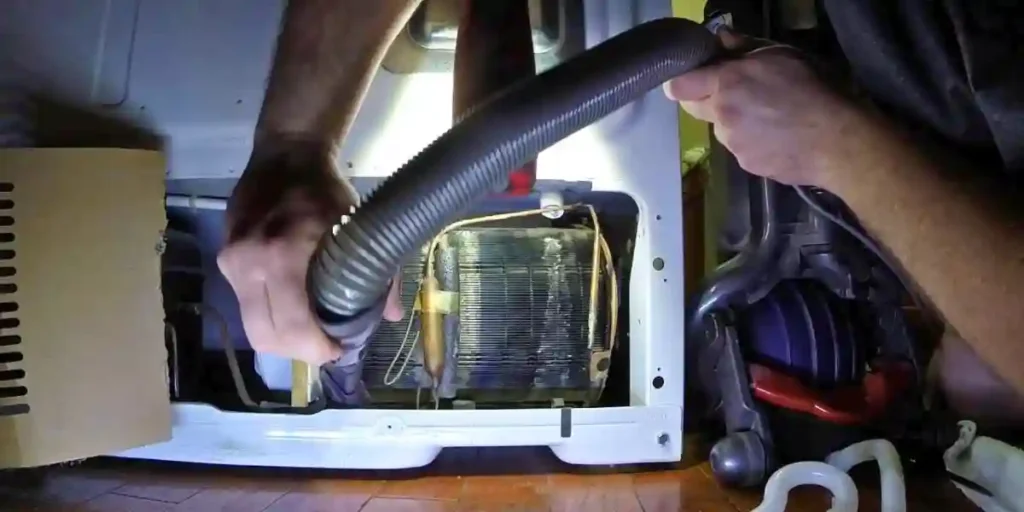
Since the condenser fan and coils work together to dissipate heat, cleaning both components is essential for optimal performance.
Cleaning Procedure:
- Locate the refrigerator condenser coils, either at the back or underneath the appliance.
- Unsnap or unscrew any protective grilles or panels covering the coils.
- Use a coil cleaning brush and vacuum cleaner to remove dust and debris from the coils.
- Regularly cleaning the coils ensures your refrigerator operates efficiently and reduces energy consumption.
Step 5: Regular Maintenance
To prolong the life of your refrigerator’s condenser fan, follow these maintenance tips:
- Clean the condenser fan and coils at least twice a year or more frequently if you have shedding pets.
- Keep the refrigerator door closed as much as possible to maintain proper cooling efficiency.
- Check the refrigerator’s temperature regularly to ensure it’s cooling correctly 2.
- Avoid overloading the refrigerator, as it can strain the fan and cooling system.
FAQs
How Can I Tell If My Refrigerator Compressor Is Bad?
What Are The Common Signs Of Refrigerator Trouble?
Can I Repair A Bad Refrigerator Compressor?
What Causes A Refrigerator Compressor To Go Bad?
How Can I Fix My Refrigerator If It’s Not Cooling?
Why Is It Essential To Maintain A Refrigerator’s Condenser Fan?
Conclusion
A failing refrigerator condenser fan can lead to constant running, higher energy bills, and potential system damage.
Unusual noises, slow movement, or hot air blowing are signs of trouble. Regular maintenance and timely repairs are crucial to keep your fridge running efficiently and prolong its lifespan.
Don’t overlook your condenser fan’s importance—take care of it for a cool, trouble-free refrigerator.